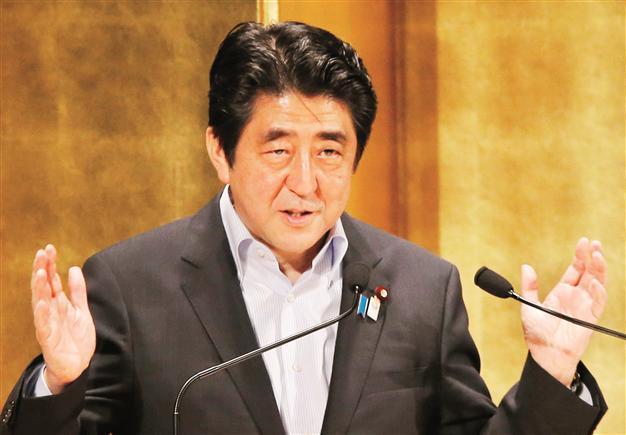US-led trade talks gain heft, complexity as Japan joins in
KUALA LUMPUR - Reuters

Japan’s entry, which takes to 12 the number of countries in the Trans-Pacific Partnership, is a key plank of Prime Minister Abe’s plans to shake up Japan’s economy and return it to growth. His “Abenomics” agenda won a further mandate on July 21 when his coalition won a strong majority in a parliamentary election. REUTERS photo
Japan joined U.S.-led trade talks yesterday, adding its weight to a pact that covers two-fifths of the world economy but raising further doubt over whether negotiators can prise open sensitive sectors such as farm goods and state-linked firms.Tokyo’s entry, which takes to 12 the number of countries in the Trans-Pacific Partnership (TPP), is a key plank of Prime Minister Shinzo Abe’s plans to shake up Japan’s economy and return it to growth after years of stagnation.
His “Abenomics” agenda won a further mandate on July 21 when his coalition won a strong majority in a parliamentary election.
A major goal of U.S. President Barack Obama’s administration, the TPP aims to tear down barriers in areas such as government procurement and set standards for workers’ rights, environmental protection and intellectual property rights.
But it faces tough resistance in several countries, including communist Vietnam and Malaysia, where state-linked enterprises and selective handouts of government contracts are entrenched and politically sensitive.
Another layer of complexity
Japan’s entry adds another layer of complexity.
“They’ll come up with some agreement, but whether it will be as deep as they want it to be is another question,” said Jayant Menon, a senior economist at the Asian Development Bank.
“Malaysia and Vietnam will never agree to the rules they want on state-owned enterprises.”
Japan, which joins the talks in Kota Kinabalu city ahead of Abe’s visit this week to Malaysia, Singapore and the Philippines, is putting its heavily protected agriculture sector up for negotiations.
Joining the TPP would account for about two-thirds of the potential gross domestic product increase brought about by “Abenomics”, according to J.P. Morgan.
But even after Abe’s resounding election victory he will remain under pressure from his conservative, ruling Liberal Democratic Party to resist U.S. calls for Japan to slash high tariffs. U.S. lawmakers stressed last week they want a deal that opens Japan to U.S. autos, farm products and insurance firms.
Japanese sources close to the talks said the government had yet to see the TPP texts and would only use the Malaysia round to assess the direction of talks on areas such as farm tariffs.
“There is no doubt Japan will have to lower the tariffs at least,” said one source, adding that it could also agree to phase out tariffs over a long period and seek exemptions. “Of course, the government will consider some kind of measures to support the agriculture industry.”
Hopes of finalising the deal by October, when Obama attends the Asia-Pacific Economic Cooperation summit in Indonesia, have faded. Government sources say the end of this year or some time in 2014 is now more realistic.
The pact is part of a U.S. strategic shift under Obama to focus more economic and military resources on Asia and balance China’s rise. Beijing has said it is studying joining the TPP, which currently includes Australia, New Zealand, Mexico, Canada, Chile, Peru, Malaysia, Vietnam, Singapore, and Brunei.
Opposition in some TPP’s goals
Some of the TPP’s goals have met opposition, with critics calling the pact secretive and warning it could restrict freedoms in order to fight digital piracy and reduce access to crucial medicines by extending drug patent protections.
In the run-up to the current round, Malaysia’s influential former prime minister Mahathir Mohamad railed against the TPP, saying it would be a surrender to big U.S. corporations.
“This is another attempt by America to let their huge corporations penetrate the markets of the small countries, in particular, government procurements,” he wrote this month.
Trade-dependent Malaysia has said the TPP is crucial for expanding its export markets, predicting an extra 10 percent of its trade would have preferential treatment under the deal.
Malaysia has already won protection in some crucial sectors, including government procurement and defence, according to a source with knowledge of the talks. But there has been limited progress in other sensitive areas, including state-owned firms.
“That’s an area where there is currently very little movement,” said the source.
















